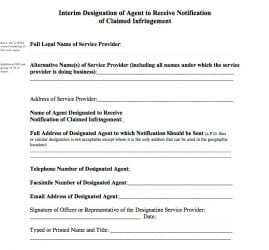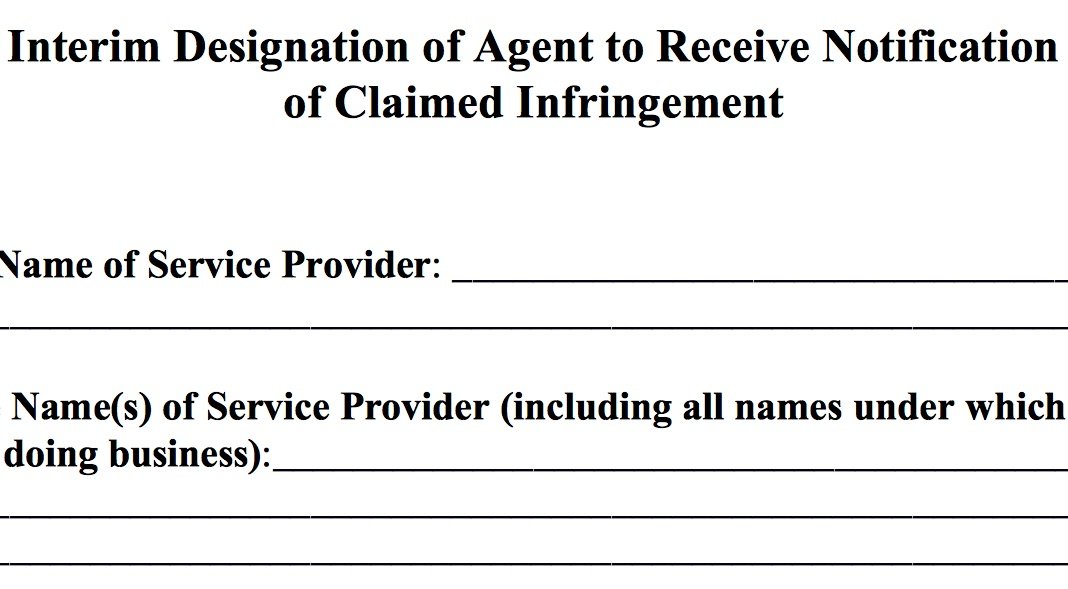U.S. Copyright Office Announces New DMCA Agent Rules
 Tthe Digital Millennium Copyright Act (DMCA) safe harbor provisions are among the most important copyright laws on the Internet today.
Tthe Digital Millennium Copyright Act (DMCA) safe harbor provisions are among the most important copyright laws on the Internet today.
Not only do they provide for the notice-and-takedown system that has become the most common form of copyright enforcement, they also legally protect web hosts and other service providers from liability.
When looking at web hosts, this is provision is ubiquitous. It provides clarity and protection for both large sites such as Facebook and YouTube, as well as small ones, such as small forums and image hosts.
Whether you host millions of videos or just have a comment section on your site, the DMCA is what makes sure you aren’t held liable for when users commit copyright infringement.
However, thanks to the U.S. Copyright Office, one of the key rules around safe harbor is changing and to understand why this is important, we first have to look at the safe harbor guidelines and where the new rules fit in.
The Basics of Safe Harbor
 When looking solely at web hosts (we won’t be looking at other types of ISPs though the rule applies to them as well), there are four main qualifications that you need in order to qualify for safe harbor protection.
When looking solely at web hosts (we won’t be looking at other types of ISPs though the rule applies to them as well), there are four main qualifications that you need in order to qualify for safe harbor protection.
- Lack actual or “red flag” knowledge of the infringement.
- Do not receive any financial benefit from the infringement if you have the ability to control it.
- Expeditiously remove or disable access to any allegedly infringing work after receiving proper notification of infringement.
- Designate a DMCA agent to receive such notices of copyright infringement and post their contact information both on your website and register it with the U.S. Copyright Office.
It’s the fourth step that’s undergoing the major change, specifically, the U.S. Copyright Office portion.
When the law took effect in 1998, the U.S. Copyright Office was charged with overseeing the database of DMCA agents, but had little time to prepare. So, for the past 18 years, the U.S. Copyright Office has used an “interim” registration system.
However, the system is riddled with problems. The largest of which is that it is completely paper-based. Sites seeking DMCA safe harbor protection need to fill out a paper form, mail it in and then have the U.S. Copyright Office scan it and add it to their outdated and outmoded database.
To put it modestly, it’s a mess.
The DMCA agent database suffers from serious decay, is difficult to use and ludicrously expensive (costing at least $105 for a registration).
However, the U.S. Copyright Office has been cognizant of these problems for sometime. In 2011, the USCO proposed changes to the DMCA database that it felt would modernize and streamline the system.
After a series of rounds of public comment, the USCO recently announced that the new system would be taking effect, effective December 1st 2016.
But while the new system does address many of the failings of the 18-year-old “interim” system, it also places new burdens on sites and web hosts. These are burdens that every site would be wise to be aware of.
How the Rules Are Changing
In short, the interim system is finally being replaced with a permanent, internet-based system.
Hosts will now be able to register their DMCA agents online and, with that, comes a severe price reduction. Rather than a $105 fee for the registration plus another $35 per 10 additional sites, the new system will have a flat $6 fee.
This, in short, means registrations will be easier and cheaper than ever before.
While that part is certainly welcome, there are two areas of controversy.
First, all existing registrations will be deleted. If you’ve registered a site or service previously, you will need to re-register by December 31, 2017 to continue to be protected.
While the 13 months is certainly a “generous” transition period (as the USCO describes it), it’s inevitable that some will simply be unaware of the need and will fail to do so, losing their safe harbor protections.
Second, the new system requires renewal registrations every three years. This is counter to the current system where, once you register, your registration remains valid for as long as the contact information is valid.
Many, including myself, worry what will happen when sites inevitably forget to renew their registration. While the USCO will allow a service provider to renew a defunct registration, it will list the dates in which the registration lapsed, exposing it to potential liability for infringements during that time.
These liabilities are not merely theoretically. Courts have ruled that, if a site does not have a DMCA agent registered (regardless of whether they meet the rest of the requirements) they do not qualify for safe harbor protection. The risk for websites is very real.
The goal of the re-registration requirement is to ensure that the information in the system is up to date. While that’s a noble goal, the issue with the current system isn’t old information, it’s out-of-date information. Some sites and hosts have kept the same DMCA contact information for well over a decade.
Re-registrations simply create a burden for service providers but don’t provide much insurance as to accuracy as 3 years is a long time for information to become out of date.
Still, for better or worse, this is the system that’s likely coming and there’s not much that websites can do about it. Without legislative or legal action, this system will come into force.
Key Points
All of that being said, here are the four points you need to know if you are a host or other service provider seeking DMCA safe harbor protection:
- The U.S. Copyright Office is replacing its “interim” DMCA agent registration system with a permanent, online-only version beginning December 1, 2016.
- All current registrations will become invalid as of December 31, 2017 and need to be re-registered before then.
- This new system will drastically reduce costs, down from at least $105 to a flat fee of $6.
- However, the new system will require that service providers re-register themselves every three years.
Barring a legal challenge or a legislative modification, this system will become the norm starting next month. While the cost and technology improvements are certainly welcome, the re-registration and renewal requirements are not, at least not by hosts and other service providers.
While $6 and an online form are not a tremendous burden, it’s a small burden that can be easily forgotten or missed. As such, many sites will, almost certainly, be exposing themselves to legal risk unintentionally.
To make sure that your site isn’t among them, you need to begin planning today and set up a protocol now to ensure that your site continues to be registered and protected moving forward.
Bottom Line
These new rules are really a mixed bag for service providers. On one hand, they provide easier, cheaper and better DMCA agent registrations. On the other, they place extra burdens on service providers, forcing them to re-register their site and then maintain that registration every three years.
While that burden is low, it’s still an easy one to forget. However, unlike a domain registration, you can’t simply pay to get more years or take other action to extend your time. You have to remember to return every three years and re-register your site(s).
As frustrating as this is, it isn’t likely to be a tectonic shift regarding liability. We currently have a much more inadequate DMCA agent system and we still see very few cases of a site or service behind held liable due to lack of DMCA agent registration.
Still, for $2 per year, it’s a risk that can be easily avoided. Even with the re-registration headache, it’s still very much worth doing.
So, this December, if you want to enjoy safe harbor protection, take a moment to register your site or service. It should take only a moment and, if you wait to do it, you risk forgetting about it.
And forgetting about it is probably the greatest obstacle to safe harbor protection with the new system.
Want to Reuse or Republish this Content?
If you want to feature this article in your site, classroom or elsewhere, just let us know! We usually grant permission within 24 hours.
